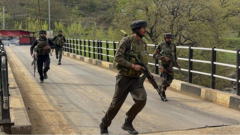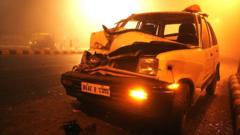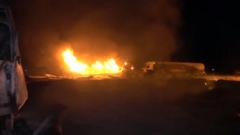A deadly assault by militants in Kashmir, resulting in the deaths of at least 26 civilians, has shattered the perception of improved stability in the region. Officials are now facing pressure to act decisively, raising fears of further escalation between India and Pakistan over the contested territory.
Attack in Kashmir Reveals Fragile Peace Amidst Ongoing Tensions

Attack in Kashmir Reveals Fragile Peace Amidst Ongoing Tensions
The recent attack on civilians in Kashmir reignites concern over regional stability and the effectiveness of India's security measures.
Article text:
In a grim reminder of the fragile status quo in Kashmir, a recent attack by militants has struck a severe blow to the notion of peace in the region. India's government, which had touted its strict security measures as effective in curtailing decades of violence, faced backlash following the brutal assault on a group of tourists picnicking in Pahalgam, leaving at least 26 civilians dead and many more injured.
On Wednesday, the scene was marked by heightened military patrols in the thriving tourist area, as officials grappled with the implications of such a significant security breach in one of the world’s most militarized zones. The attack has reignited fears that Prime Minister Narendra Modi's administration may feel pressured to respond aggressively—potentially exacerbating tensions with Pakistan, which India accuses of sponsoring terrorism.
Kashmir remains a contentious flashpoint between India and Pakistan, both of which lay claim to the region following the end of British colonial rule. The historical rivalry has seen numerous conflicts, and incidents like this latest attack are reminders of the deep-seated issues yet to be resolved.
D.S. Hooda, a retired Indian army general, suggested that the attack sought to undermine the official narrative of stability, emphasizing the government's newfound urgency to tackle this resurgence of violence. This scenario echoes the 2019 incident when an attack led to a near-war situation between the states, underscoring the volatility that continues to characterize the Kashmiri conflict.
The weight of expectation is now heavy on Indian authorities to act, with domestic and international observers closely watching for signs of how the government will navigate the complexities of security and regional peace in the wake of this tragedy.
In a grim reminder of the fragile status quo in Kashmir, a recent attack by militants has struck a severe blow to the notion of peace in the region. India's government, which had touted its strict security measures as effective in curtailing decades of violence, faced backlash following the brutal assault on a group of tourists picnicking in Pahalgam, leaving at least 26 civilians dead and many more injured.
On Wednesday, the scene was marked by heightened military patrols in the thriving tourist area, as officials grappled with the implications of such a significant security breach in one of the world’s most militarized zones. The attack has reignited fears that Prime Minister Narendra Modi's administration may feel pressured to respond aggressively—potentially exacerbating tensions with Pakistan, which India accuses of sponsoring terrorism.
Kashmir remains a contentious flashpoint between India and Pakistan, both of which lay claim to the region following the end of British colonial rule. The historical rivalry has seen numerous conflicts, and incidents like this latest attack are reminders of the deep-seated issues yet to be resolved.
D.S. Hooda, a retired Indian army general, suggested that the attack sought to undermine the official narrative of stability, emphasizing the government's newfound urgency to tackle this resurgence of violence. This scenario echoes the 2019 incident when an attack led to a near-war situation between the states, underscoring the volatility that continues to characterize the Kashmiri conflict.
The weight of expectation is now heavy on Indian authorities to act, with domestic and international observers closely watching for signs of how the government will navigate the complexities of security and regional peace in the wake of this tragedy.





















